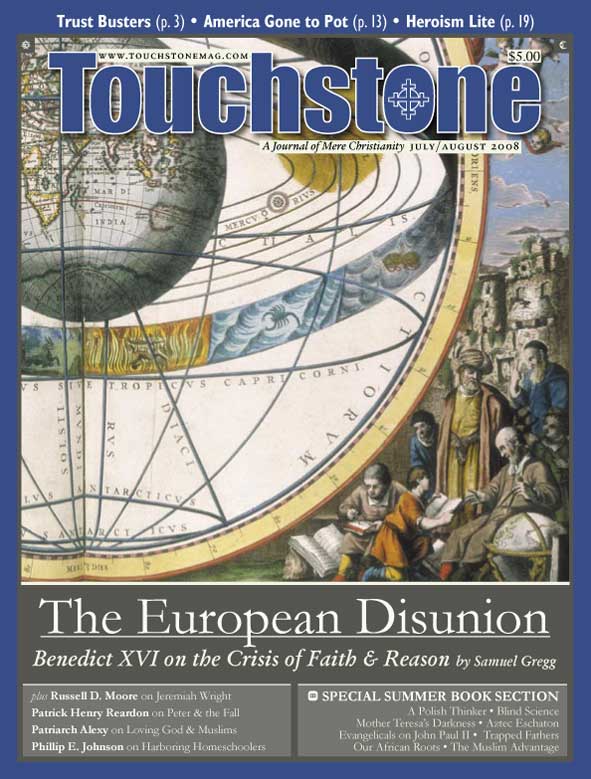Editorial
Trust Busters
When Authorities Smash Windows
In a satirical piece on the differences between school fifty years ago and school nowadays, which has been circulating on the Internet for a while, a boy named Jack goes quail hunting before school and pulls into his school’s parking lot with his shotgun in the gun rack.
In 1957, “the Vice Principal comes over, looks at Jack’s shotgun, goes to his car and gets his shotgun to show Jack.” In 2007, “School goes into lock-down, FBI called, Jack hauled off to jail and never sees his truck or gun again. Counselors called in for traumatized students and teachers.”
Losing Trust
It’s a witty exaggeration, but not much of one. The piece includes seven similar comparisons, and interestingly, the humor in almost all of them is based upon a loss of trust.
There is a wisdom in this. A vice we dismiss as minor may do little harm on its own. But if it compromises trust—if it works to undo the fiber of relations that knit a people together—it can leave us in a shambles.
For there can be no genuine society without trust. In The Moral Basis of a Backward Society, written in 1958, the Harvard political scientist Edward Banfield noted that you can’t get anything so complex as a business off the ground when you aren’t reasonably sure of a moral orderliness and sobriety around you, when you can’t trust others to tell the truth, keep their promises, and not rob you when you’ve turned away.
You have to be sure that most of your workers will show up on time, that they will not clean out the till, that the local officials will treat your business fairly and not steer work to their cousins, and that local “businessmen” will not ask for protection money once you start to clear a profit.
But even in the society he examined—southern Italy—though you could not trust others to act in a way that helps develop a modern economy, you could trust that they would act in such a way as to make a stable and living culture. You could be sure that if Giovanni had his way with Filomena by force, Filomena’s brothers would see to it that he could never do such a thing again. If he seduced her and got her in trouble, the brothers would show up at his door to congratulate him on his upcoming nuptials.
In general, you could count on families to protect and promote their own. You could expect hospitality, some cleanliness, respect for the aged, and self-reliance.
What happens when you cannot trust others to act this way? What happens, for example, when the windows in a neighborhood are smashed and never fixed? Rudy Giuliani, no moralist, can tell you: Crime sets in. The causal arrow goes both ways: Where there’s crime, you’ll find broken windows, but, as George L. Kelling and James Q. Wilson wrote in “Broken Windows,” a famous essay in The Atlantic, where there are broken windows, there will be crime.
When windows are smashed and not repaired—a symbol in the article for all the forms of minor social disorder—the people lose heart. They grow used to disorder. Worse, they lose trust: You cannot depend that the owners of the properties around you care enough about them, or about you, to evict a dope-peddler, when they do not trouble to fix a window. Being unable to trust others, you tend to become less trustworthy yourself. (Why invest in your property when the wrecks beside it will bring down the value whatever you do?) And, trust gone, the neighborhood deteriorates.
Little Breaks
We have, in our society, many broken windows that those in authority neglect or refuse to fix. They always seem to be little things, like dirty graffiti in a playground. Let it alone, we say. If we trouble about it, we might only make things worse.
For several decades the hierarchs of our churches—men who have assumed the responsibility for governing their people—have failed to discipline those who in some way deny the faith or their church’s confessions, or ignore the disciplines, or modify the worship to please the secular, or encourage their people to discard those parts of the Christian moral teaching, usually having to do with zippers, they may find “unrealistic” or “outdated.”
They have handed out to the vandal a little can of spray paint and a baseball bat. It doesn’t seem like much, but the results are obvious. Catholics like me have had to endure the shame of the sex-abuse scandal, and other churches have suffered scandals of their own. The pews have emptied. Fewer and fewer people bother to attend those churches that least trouble themselves to insist on fidelity to doctrine and discipline, just as they would not visit streets full of smashed bottles and caved-in fences.
Many of the people who ought to be most involved, most energetic, have grown disheartened. I meet Catholic homeschoolers, for example, who want to send their children to a parochial school, but cannot trust it to teach their children the faith with bold confidence and a full commitment to what they see as the truth. And so the schools themselves, which often desperately need the students, the tuition, and the involvement of such parents, lose them, and dwindle away.
Similarly, in our public schools, administrators and teachers have taken up the hammers and smashed plenty of windows themselves. They habitually teach a moral relativism that justifies knavery and whoring.
The greatest literature is taught as if it were the cover for oppression. The religious heritage of mankind is treated as the product of ignorance now outgrown, at best a private consolation. American history is turned into a long racist, capitalist, elitist, or criminal enterprise, with the exception of certain heroes like Sacagawea, Malcolm X, and Franklin D. Roosevelt.
All these things undermine the child’s trust: trust in the authorities, especially parents and pastors, who had taught them their morality and religion and history. But the cynicism is an acid that eats its own container. Why should the children not also distrust their schools? They learn the corrosive method of criticism and distrust and apply it to the doctrines their teachers have tried to pass on to them. They become as cynical about FDR as they are about George Washington.
They learn that everyone speaks as the Scribes and the Pharisees. These children are not so much “postmodern” as fundamentally distrustful. They cannot learn as long as they remain so. From them who have little, even the little that they have shall be taken from them.
Arrogating Schools
But there is one thing that blows trust sky high, and that is the schools’ decision to set themselves essentially at enmity with the family, arrogating to themselves the rights of parents.
They offer, rather demand, “sex education” classes, which teach a morality that treats men and women as beasts in heat, with all things licit so long as they can pretend to be “safe.” They encourage children to “respect” themselves and be “mature,” which is to say, they preach a morality that gives the children a nice excuse if they sneak around behind their parents’ backs to act like knaves and whores, so long as they use the right contraceptive devices.
And there’s worse. Any reader of the alternative news will hear of schools that happily hand out condoms to little boys and estrogen to little girls, or force them to participate in discussions of the family in which “family” is defined as almost any sexual pairing, or to set themselves in any number of ways against their parents. Indeed, any parent who does not know that he is, relationally if not personally, at enmity with the school’s social worker, is a fool.
This scholastic social experimentation also destroys the parents’ trust in their schools and the official world they represent. Much of the protest and activism of the “religious right,” constantly denounced by our liberal elites, is produced not by their religion but by their care for their children. If they could trust their schools—if their schools had not so grossly abused their trust and forfeited it—they would be the most docile of citizens.
Maybe hauling Jack off to jail now is understandable—because there is no trust between the school and the community, nor is there much of a “community” to trust the school or to be trusted. A boy with a shotgun in his car may well intend to use it against students or teachers, not quail. I concede that most of us, now, would not want the principals of our children’s schools to ignore a boy with a shotgun.
I don’t care if there’s never a gun brought to another American school for the next hundred years. I long for a world wherein bringing a gun to school would be inconsequential, because everybody could be sure that it was for hunting quail, or for a Civil War display, not for shooting your fellow students.
That would be a world of self-reliant and stable families, the communities they foster, and the schools they permit to teach their children. The windows wouldn’t be broken. In that world, you would no more teach high-school students puerile obscenities than you would take a gun to pepper the gym class—or smash the windows of your own home.
— Anthony Esolen, for the editors
Anthony Esolen is Distinguished Professor of Humanities at Thales College and the author of over 30 books, including Real Music: A Guide to the Timeless Hymns of the Church (Tan, with a CD), Out of the Ashes: Rebuilding American Culture (Regnery), and The Hundredfold: Songs for the Lord (Ignatius). He has also translated Dante’s Divine Comedy (Random House) and, with his wife Debra, publishes the web magazine Word and Song (anthonyesolen.substack.com). He is a senior editor of Touchstone.
subscription options
Order
Print/Online Subscription

Get six issues (one year) of Touchstone PLUS full online access including pdf downloads for only $39.95. That's only $3.34 per month!
Order
Online Only
Subscription

Get a one-year full-access subscription to the Touchstone online archives for only $19.95. That's only $1.66 per month!
bulk subscriptions
Order Touchstone subscriptions in bulk and save $10 per sub! Each subscription includes 6 issues of Touchstone plus full online access to touchstonemag.com—including archives, videos, and pdf downloads of recent issues for only $29.95 each! Great for churches or study groups.
Transactions will be processed on a secure server.
more from the online archives

33.2—March/April 2020
Christian Pro-Family Governments?
Old & New Lessons from Europe by Allan C. Carlson
calling all readers
Please Donate
"There are magazines worth reading but few worth saving . . . Touchstone is just such a magazine."
—Alice von Hildebrand
"Here we do not concede one square millimeter of territory to falsehood, folly, contemporary sentimentality, or fashion. We speak the truth, and let God be our judge. . . . Touchstone is the one committedly Christian conservative journal."
—Anthony Esolen, Touchstone senior editor








